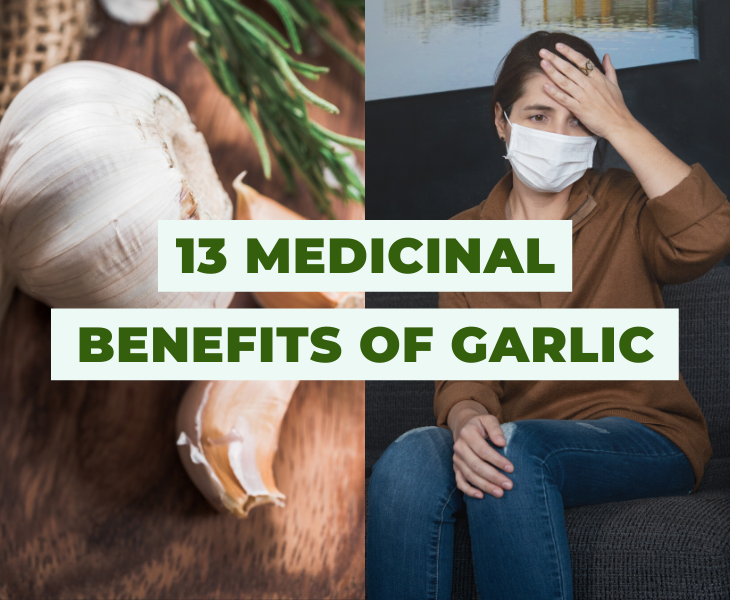In this article, you will learn the medicinal benefits of garlic that you might not know yet. Make sure to continue reading until the end. Let’s get started!
Garlic is a glabrous, bulbous herb that grows to about 30 cms high. The leaves of are flat, narrow, and long. The bulb consists of numerous bulblets, known as cloves, enclosed within a whitish skin. It is a well-known herb in the garden. It is grown for culinary and medicinal purposes.
Medicinal Benefits of Garlic
1. To kill or expel worms from the body
Garlic contains a compound called allicin, which is responsible for its characteristic smell and many of its potential health benefits. Allicin has shown some antimicrobial and antiparasitic properties in laboratory studies.
It has been suggested that the strong odor and taste of garlic may discourage certain worms and parasites from inhabiting the digestive tract, potentially causing them to leave the body.

2. Prevents or cures spasms
Garlic contains various compounds that have been studied for their potential medicinal properties, but there is limited scientific evidence specifically regarding its impact on spasms.
Garlic does possess certain properties that might be relevant to muscle function, such as anti-inflammatory and antioxidant effects.
These properties could potentially contribute to the management of conditions associated with spasms, but more research is needed to determine the extent of its benefits.
3. Stimulates the flow of saliva, helps in digestion, and relieves flatulence and griping pains from the stomach and bowels
Garlic contains compounds that have been associated with these potential benefits.
Garlic has been used for centuries in traditional medicine to promote digestion. It is believed to stimulate the production of digestive enzymes, which can enhance the breakdown and absorption of nutrients in the gastrointestinal tract.
Additionally, garlic may have carminative properties, which means it can help reduce excessive gas and relieve bloating or flatulence.
Garlic’s potential effects on digestion can be attributed to various components, including enzymes, sulfur-containing compounds, and antioxidants.
These compounds are thought to stimulate the release of gastric juices, improve digestion, and alleviate discomfort in the gastrointestinal system.
4. Promotes the flow of urine
Garlic has been traditionally believed to have diuretic properties, which means it may promote the flow of urine. However, scientific evidence supporting this claim is limited, and more research is needed to determine the extent of garlic’s diuretic effects.
Diuretics are substances that increase urine production and promote the excretion of water and electrolytes from the body. Some studies have suggested that certain components of garlic, such as organosulfur compounds, may have mild diuretic effects.
However, the evidence is not conclusive, and the diuretic effects of garlic are not as well-established as those of pharmaceutical diuretic medications
5. To reduce or eliminate fevers
Garlic has been used in traditional medicine for its potential antipyretic (fever-reducing) properties. It is believed that certain compounds found in garlic, such as allicin, may possess antimicrobial and immune-modulating effects that could help in reducing fevers.
However, it’s important to note that the scientific evidence supporting garlic’s effectiveness in reducing or eliminating fevers is limited.
Garlic’s potential antipyretic effects have mainly been studied in animal models or in vitro (test tube) experiments. Well-controlled clinical trials in humans are necessary to establish its true efficacy in this regard.
6. Promotes the dissipation of a growth or swelling
Garlic has been traditionally used for its potential anti-inflammatory properties, which may contribute to its perceived benefits in reducing swelling.
Garlic contains certain compounds, such as allicin and other sulfur-containing compounds, which have been associated with anti-inflammatory and antioxidant effects.
These properties could potentially have some impact on swelling or inflammation in certain contexts.
However, the efficacy of garlic in promoting the dissipation of growths or swellings will depend on the underlying cause and nature of the specific condition.
7. Can be used in chronic bronchitis, tuberculosis, pneumonia, asthma, and other respiratory ailments
Garlic may contain bioactive compounds with antimicrobial, anti-inflammatory, and antioxidant properties that could be beneficial for respiratory health.
Garlic’s potential anti-inflammatory properties may provide some relief for respiratory symptoms such as chronic bronchitis, tuberculosis, pneumonia and asthma, although more research is needed to understand the extent of its effects.

8. It is an excellent medicine for colds and can be used in the case of sore throat, hoarseness, and tonsillitis
Garlic may have antimicrobial properties that could help prevent the growth of certain bacteria and viruses, which are often associated with colds and other respiratory infections.
9. The Best remedy for hypertension
Some studies have suggested that garlic may have modest benefits in helping to lower blood pressure. Garlic contains compounds such as allicin that have shown potential in improving cardiovascular health and reducing blood pressure.
These compounds are believed to have vasodilatory effects, which means they may help relax and widen blood vessels, leading to a decrease in blood pressure. Garlic may also have antioxidant and anti-inflammatory properties that can contribute to overall cardiovascular health.
10. Acts as an antibiotic and prevents cancer
The extent of garlic’s antibiotic activity and its effectiveness against specific pathogens may vary. Garlic contains sulfur-containing compounds, including allicin, which are believed to contribute to its antimicrobial properties.
These compounds have shown activity against various bacteria, fungi, and some viruses in laboratory settings.
Some studies have suggested that garlic may possess antioxidant and anti-inflammatory effects, which could potentially help reduce the risk of certain types of cancer.
However, more research is needed to fully understand the mechanisms and benefits of garlic in cancer prevention.
11. A good remedy for earache and deafness
Garlic is believed to have antimicrobial properties that may help combat certain ear infections. However, it is crucial to seek proper medical evaluation and treatment for ear-related issues. Consulting a healthcare professional is essential to determine the underlying cause of the earache or deafness and to receive appropriate medical advice.
12. It is also good for various skin problems
Garlic contains compounds such as allicin, which has shown antimicrobial effects against certain bacteria and fungi. This property may be beneficial in managing certain skin infections, such as acne or fungal infections.
Additionally, garlic’s potential anti-inflammatory and antioxidant properties may contribute to reducing inflammation and protecting the skin against oxidative damage.
13. Scientific studies have proved that consumption of this herbal plant reduces the cholesterol level in the body
There is some evidence to suggest that garlic may have a modest effect on reducing cholesterol levels in the body. Garlic contains compounds such as allicin and other sulfur-containing compounds that have been studied for their potential lipid-lowering effects.
Several studies have shown that garlic supplementation, particularly aged garlic extract, can lead to modest reductions in total cholesterol and LDL cholesterol levels (often referred to as “bad” cholesterol) in individuals with high cholesterol. However, the effects of garlic on cholesterol levels may vary among individuals, and the overall impact may be relatively small.
 How To Use Garlic As Herbal Plants
How To Use Garlic As Herbal Plants
The use of raw garlic in salads is one of the best remedies for hypertension.
- The decoction of garlic mixed with coconut oil is given for worms and in smaller doses, it is good for infection of the respiratory tract and hysteria.
- The tea, sweetened with honey is recommended for whooping cough, fever, and disorders of the nervous system.
- Externally used, it is a disinfectant. It is applied to tumors and wounds. It is recommended as a poultice for ringworms.
- Raw garlic juice is good for whooping cough and pulmonary consumption or tuberculosis. Diluted in water the juice is good for earache, deafness, and the prevention of grey hair. The juice is also used for skin eruptions, corns, fungal infections of the skin, and skin spots.
- A crushed clove heated in a tiny vessel or tablespoon containing used for earaches. Only mild warm oil should be introduced into the painful ear.
Parts To Use:
The bulb (a food, the whole plant can be used).
Dose: As indicated above.
Caution: Those who suffer from hypotension (low blood pressure) should not use it.
The Bottom Line
Taking advantage of the medicinal benefits of garlic can help improve our bodies’ health and that also adds amazing flavor to our food. Garlic can be included as part of a healthy diet, but it should not replace the importance of overall lifestyle modifications and medical guidance.
It is important to consult with a healthcare professional for a proper diagnosis and appropriate treatment. They can evaluate your specific condition, provide guidance, and recommend evidence-based therapies that are known to be effective.
Did you find this helpful? Let us know in the comments.
You might also like:
- How to Best Use Garlic Oil For Hair Growth Stimulation?
- Everything You Need to Know About The 8 Best Benefits of Using Garlic at Night?
- 13 Surprising Facts About Garlic That Might Interest You
- 8 Remarkable Health Benefits of Garlic That You Should Know About
Disclaimer: The following information is provided solely for informational purposes and should not be considered professional advice or a substitute for professional consultation. While every effort has been made to ensure the accuracy and reliability of the information presented, we make no representations or warranties of any kind, express or implied, regarding the completeness, accuracy, reliability, suitability, or availability of the information provided. Any reliance you place on such details is strictly at your own risk.










1 thought on “13 Powerful Medicinal Benefits of Garlic”